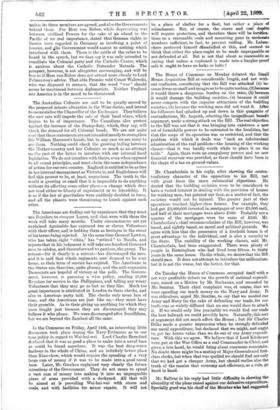Mr. Chamberlain in his reply, after showing the contra- tradictory
character of the opposition to his Bill, met with great force the more substantial objections. He denied that the buildin,,a societies were to be considered to have a vested interest in dealing with the provision of houses for working men, but pointed out that, as a matter of fact, the societies would not be injured. The greater part of their operations touched higher-class houses. For example, they had got 22,000,000 invested in mortgages of over 25,000 each, and half of their mortgages were above £500. Probably not a quarter of the mortgages were for sums of £240. Mr. Chamberlain's chief recommendation of the Bill, however, was based, and rightly based, on moral and political grounds. We agree with him that the possession of a freehold house is of great advantage to the individual, and is also a security to the State. The mobility of the working classes, said Mr. Chamberlain, had been exaggerated. There were plenty of people in Birmingham who had lived from fifteen to thirty years in the same house. On the whole, we desire that the Bill should pass. It does not attempt to introduce the millennium, but it is not the worse, but the better, for that.






































 Previous page
Previous page